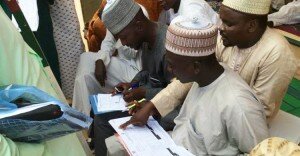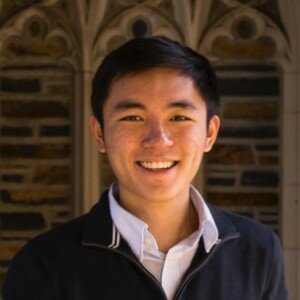A Sightsavers’ project in Nigeria has been awarded a grant of $50,000 from the Sabin Vaccine Institute’s END7 campaign to help tackle neglected tropical diseases (NTDs). This generous grant will have a significant impact on the future of communities in Kebbi State in Nigeria and will enable Sightsavers to get one step closer to eliminating five NTDs in the state.
NTDs can have a horrifying effect on people of all ages. Symptoms of these devastating diseases include kidney disease, blindness, malnutrition, anaemia, and even death. NTDs can stop people from working, living independently, or even from getting an education. Many of these symptoms can be alleviated through treatment and stronger health systems.
END7 is an international advocacy campaign that’s seeking to raise the awareness and funding necessary to control and eliminate the seven most common NTDs. The campaign is managed by the Sabin Vaccine Institute and has mobilized a diverse and growing community of supporters from countries around the world dedicated to supporting the fight against these diseases.
Sightsavers’ Kebbi State NTD elimination program is targeting the elimination of five devastating NTDs including schistosomiasis, soil-transmitted helminths, trachoma, river blindness and lymphatic filariasis. With END7’s support, Sightsavers is working with the Federal and Kebbi State Ministries of Health to train more than 1,000 primary health workers and more than 7,000 community volunteers to undertake mass drug administration (MDA) that will help protect nearly 6 million people in some of Nigeria’s poorest rural communities.
END7’s funding will also support the training of 355 teachers to manage school-based MDA to protect children from schistosomiasis. Sightsavers is collaborating with the Kebbi State Ministry of Education to prepare schools and teachers to get treatment to all enrolled school children. This work is already beginning to impact Nigerians, including Manir Mamuda, a 15 year old boy who lives with his parents in the region. Manir is training to become a carpenter, but for the past year Manir was suffering from the symptoms of schistosomiasis. Despite seeking help from a traditional healer in his community, his symptoms were not improving.
Luckily, Manir heard about the free treatment being distributed at his local school during a community awareness event. He decided to visit the school while treatment was being distributed and received treatment he needed.
“I was measured with a tape and given 4 tablets of the drug, which I took immediately,” said Manir. “After one week, I stopped seeing blood in my urine. The medicine is good because it has helped me and I am happy. I hope to continue to take it. I feel very well now and can comfortably learn the carpentry skills I need to earn a living”
Sightsavers’ Nigeria Country Director, Sunday Isiyaku has also seen the positive impact of these services in communities across the country. “Thanks to Sabin’s END7 campaign in 2016, we are able to protect the most vulnerable communities in Kebbi state from these painful and disabling diseases. The project will reach people that usually cannot find their way to health centers to access health services including women, the elderly and people with disabilities. By using community outreach and door-to-door approaches, our health workers and community volunteers are going the extra mile in reaching these groups.”
“Sabin has a proud history of vaccine advocacy, and we are pleased that we can further this mission through our recent grant to Sightsavers in Nigeria,” said Amy Finan, CEO of the Sabin Vaccine Institute. “In a region where more than 5 million people are at risk of contracting an NTD, Sabin’s grant will enable Sightsavers to fill a gap in the current health system by providing efficient, cost-effective control efforts. This project has the potential to improve quality of life for millions of Nigerians, and I look forward to following its impact in the months and years ahead.”
The recent grant awarded to Sightsavers by the Sabin Vaccine Institute will enable vital NTD control efforts to continue in the state of Kebbi. By promoting sustainable health systems in the region, Nigerians living in Kebbi and beyond will be able to live without the burden of these debilitating diseases.
This post was originally published on Sightsaversusa.org.

 John Lu is a rising junior at Duke University studying chemistry, mathematics, and global health. During his sophomore year, he created and taught Duke’s first for-credit course on neglected tropical diseases. He also founded the
John Lu is a rising junior at Duke University studying chemistry, mathematics, and global health. During his sophomore year, he created and taught Duke’s first for-credit course on neglected tropical diseases. He also founded the 
 On March 1, 2016, I attended the END7 Student Advocacy Day in Washington, D.C. alongside forty other college students representing END7 from all across the United States. Together we met with 39 offices of U.S. senators and representatives to discuss the United States Agency for International Development’s Neglected Tropical Diseases (NTD) Program budget. My group had a meeting with the office of Senator Diane Feinstein of California. The moment that I so vividly remember from that meeting was when the senator’s advisor told us that speaking to us about this issue we were so passionate about gave her hope for our generation, and that she felt confident that the future is in the right hands. Though she may not have fully shared our particular passion for NTDs, our meeting reinforced her belief in our generation’s ability to make a difference in our country and in the world.
On March 1, 2016, I attended the END7 Student Advocacy Day in Washington, D.C. alongside forty other college students representing END7 from all across the United States. Together we met with 39 offices of U.S. senators and representatives to discuss the United States Agency for International Development’s Neglected Tropical Diseases (NTD) Program budget. My group had a meeting with the office of Senator Diane Feinstein of California. The moment that I so vividly remember from that meeting was when the senator’s advisor told us that speaking to us about this issue we were so passionate about gave her hope for our generation, and that she felt confident that the future is in the right hands. Though she may not have fully shared our particular passion for NTDs, our meeting reinforced her belief in our generation’s ability to make a difference in our country and in the world.